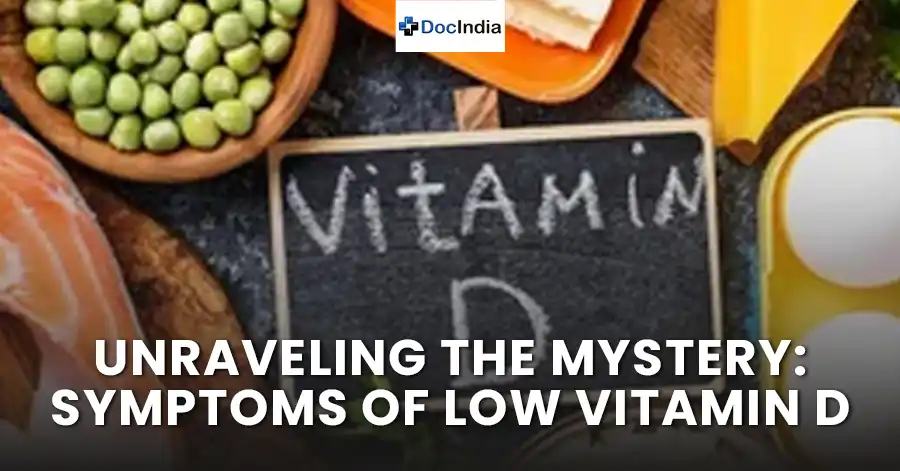Unraveling the Mystery: Symptoms of Low Vitamin D

Symptoms of Low Vitamin D
Known as the "sunshine vitamin," vitamin D is essential for preserving general health and wellbeing. It is produced in the skin when exposed to sunlight and is necessary for a number of body processes. But even with its significance, a lot of people lack enough vitamin D, which can result in a number of health problems. The symptoms, causes, suggested intake, and possible treatments of vitamin D insufficiency will all be covered in detail in this study.
Vitamin D Deficiency:
Your body becomes deficient in vitamin D when it doesn't receive enough of this essential nutrient. This can happen for several causes, including inadequate exposure to sunlight, dietary choices, and certain medical disorders that restrict the absorption of vitamin D. A deficit can have far-reaching effects on immune system performance, bone health, and general vitality.
How Much Vitamin D Do I Need?
Variations exist in the recommended daily consumption of vitamin D due to age, sex, and general health. According to the standards, varying quantities are needed by newborns, children, adults, and elderly. Although exposure to sunlight is the best source of vitamin D, food sources and supplementation are also frequently employed. It's essential to recognise your unique demands if you want to stay healthy and avoid developing symptoms associated with deficiencies.
Symptoms:
- Fatigue: Persistent tiredness and a lack of energy can be indicative of low vitamin D levels.
- Muscle Weakness: Weakness in muscles, especially in the proximal muscles (closest to the body's core), may signal a deficiency in vitamin D.
- Bone Pain: Vitamin D plays a crucial role in calcium absorption, and its deficiency can lead to bone pain and a heightened risk of fractures.
- Weakened Immune System: Vitamin D is known for its immune-boosting properties. Low levels may compromise the immune system, making individuals more susceptible to infections and illnesses.
- Mood Swings and Depression: Emerging research suggests a link between vitamin D and mood regulation. Deficiencies may contribute to mood swings and an increased risk of depression.
- Difficulties in Wound Healing: Vitamin D is essential for the production of antimicrobial peptides that aid in wound healing. Insufficient levels can lead to delays in the healing process.
Recognizing these symptoms is pivotal in identifying a potential vitamin D deficiency. Individuals experiencing these signs should consult with healthcare professionals for proper assessment and guidance on appropriate interventions, whether through lifestyle changes, dietary adjustments, or vitamin D supplementation. Early detection and proactive measures can significantly contribute to overall health and well-being.
Causes:
- Limited Sunlight Exposure: The primary source of vitamin D is sunlight. Individuals who spend minimal time outdoors, work indoors, or use excessive sunscreen reduce their exposure to ultraviolet B (UVB) rays, hindering the skin's ability to synthesize vitamin D.
- Skin Tone: People with darker skin tones have higher melanin levels, which act as a natural sunscreen. This reduces the efficiency of vitamin D synthesis in the skin, necessitating more extended exposure to sunlight for sufficient production.
- Age: Older adults often have decreased skin thickness and reduced efficiency in producing vitamin D upon sun exposure. Additionally, they may spend more time indoors, further limiting their sunlight exposure.
- Medical Conditions: Certain medical conditions, such as malabsorption disorders (e.g., celiac disease, Crohn's disease), can impede the absorption of vitamin D in the intestines, leading to deficiency.
- Obesity: Vitamin D is fat-soluble, and individuals with obesity may sequester vitamin D in fat tissues, reducing its availability for use in the body.
- Poor Dietary Choices: Inadequate intake of vitamin D-rich foods, such as fatty fish, fortified dairy products, and egg yolks, contributes to deficiencies. A diet lacking in these sources may increase the risk of vitamin D insufficiency.
Understanding these contributing factors is essential for individuals to assess their risk of vitamin D deficiency. Addressing these causes through increased sunlight exposure, dietary modifications, and, when necessary, supplementation can help prevent and manage deficiencies effectively.
Treatments:
- Increased Sunlight Exposure: Spending time outdoors, especially during peak sunlight hours, is a natural way to boost vitamin D levels. Aim for at least 15 to 20 minutes of sun exposure on the face, arms, and legs several times a week.
- Dietary Adjustments: Including vitamin D-rich foods in the diet is crucial. Fatty fish like salmon and mackerel, fortified dairy products, and egg yolks are excellent sources. Incorporating these foods can contribute to overall vitamin D intake.
- Supplementation: When natural sources and dietary adjustments are insufficient, vitamin D supplements may be recommended. These supplements come in various forms, with vitamin D2 and D3 being the most common. Vitamin D3 is preferred due to its increased potency and longer-lasting effects in the body.
- Healthcare Professional Guidance: It's essential to consult with a healthcare professional before starting any supplementation regimen. They can assess individual needs, taking into account factors like age, health status, and the severity of the deficiency, to prescribe the appropriate dosage.
- Monitoring and Adjusting: Regular monitoring of vitamin D levels through blood tests helps healthcare professionals track progress and make necessary adjustments to the treatment plan. This ensures that the chosen interventions are effectively addressing the deficiency while avoiding potential toxicity.
Addressing vitamin D deficiency requires a personalized and comprehensive approach, combining lifestyle changes, dietary modifications, and, when necessary, supplementation under professional guidance.
In summary, maintaining adequate levels of vitamin D is crucial for overall health and well-being. Understanding the symptoms, causes, and treatments for vitamin D deficiency empowers individuals to take proactive steps in preventing and addressing this common issue. Whether through increased sunlight exposure, dietary adjustments, or supplementation, the key lies in being mindful of the body's needs and responding accordingly. By prioritizing vitamin D, individuals can unlock the potential for improved bone health, enhanced immunity, and a better quality of life. Remember, when it comes to vitamin D, a little sunshine can go a long way.
